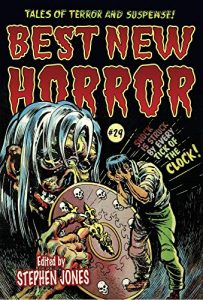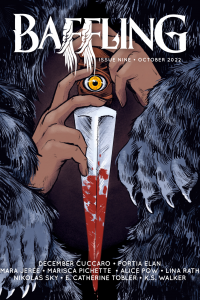Arley Sorg Reviews Best New Horror #29, Edited by Stephen Jones
 Best New Horror #29, Stephen Jones, ed. (PS Publishing/Drugstore Indian Press 978-178636-392-3, £14.99, 579pp, tp) February 2019. Cover by Howard Nostrand.
Best New Horror #29, Stephen Jones, ed. (PS Publishing/Drugstore Indian Press 978-178636-392-3, £14.99, 579pp, tp) February 2019. Cover by Howard Nostrand.
In 1990 Constable & Robinson published the first Best New Horror, edited by Stephen Jones & Ramsey Campbell, featuring horror short fiction from 1989. That volume won a British Fantasy Award, a World Fantasy Award, and began a legacy. Jones became sole editor with 1995’s The Best New Horror Volume 6 (Robinson imprint Raven Books). 2014’s The Mammoth Book of Best New Horror 25 was the last in the regular series to come from Robinson.
These anthologies generally do far more work than just presenting a handful of stories. Volume 29 opens with “Horror in 2017”, a thorough (100 pages!) survey of the year in horror publishing. Appealing to avid readers and collectors, it covers sales trends, magazines, books, and more, with only a little editorial commentary and opinion. The anthology closes with a 103-page “Necrology” compiled by Jones and Kim Newman: a list of deaths in the cinematic and literary horror fields; as well as 12 pages of “useful addresses,” which include organizations, publishers, and more. All told, 215 pages of non-fiction, with 356 pages devoted to 21 pieces of fiction, each story presented first by several paragraphs of author/story introduction.
This book is not the place to go to discover new voices in horror. The fiction here comes from well-established authors, many with multiple collections or novels or awards under their belts, and many who have appeared a number of times in the Best New Horror series (such as Nicholas Royle, whose “Archway” appeared in the first volume). A few different countries are represented, but, otherwise, diversity within the authorship is not – all of the authors are (or at least, appear to be) white, though some of the stories reflect a larger diversity within their cast of characters.
A specific effect of this population is a trend towards well-written, character-focused, introspective narratives which introduce the horrific later, or which build up to the horrific in a slow, sometimes languorous, burn. Helen Marshall’s “Survival Strategy” opens the collection, setting this tone, while delving into fear and paranoia centered around travel in the US, and offering commentary on publishing and simultaneously demonstrating an expertise in quick, interesting character sketches. “CWTCH” by Conrad Williams utilizes strong setting, description, and overall lovely writing, to build story nicely in a meditation on regret, death, shame, and family. “The Flower Unfolds” by Simon Strantzas has a good opening, with a hyper-focused sense of anxiety, then continues with arresting descriptions throughout and lands a pretty satisfying ending.
Not all the stories worked for me. That could probably be said of most anthologies for most readers; but in this case, there are specific reasons. In several of the stories the writing is too elaborate on a line-by-line basis, too intellectualized, damping any “horror” effect in favor of long phrasings and passive structures. Add to this the “slow burn” element mentioned above, and the writing separates me from characters and story by too many miles – forget about tension or suspense. There are readers who will enjoy this style of writing and those stories are more likely to work for them.
“His Heart Shall Speak No More” by John Linwood Grant stands as interesting in this light. It’s a slow build, told in period-ish language with a vague, similar setting – the era of “wagonettes,” essentially. Lines are carefully structured while being more straightforward than some of the other stories. Intrigue builds as each step of the story is taken, and as one curious element after another is introduced. The result is a ghost story which reads like something you’d find in an anthology called “Classic Ghost Stories” but which is still entertaining. “The Endless Corridor” by Reggie Oliver is similar, in that it reads like it comes from an anthology of old gothic horror tales. From the introduction, this is likely deliberate. It’s an interesting piece with some clever writing, and fans of the gothic will enjoy it.
Other stories dive right in and feel more modern. Tim Lebbon’s “In Stone” is such a read, with striking imagery and ideas. Ramsey Campbell’s “Speaking Still”, about a man obsessing over his dead wife, keeps with the modern tone, while feeling deeply personal. “Underwater Ferris Wheel” by Michael Bailey utilizes the carnival theme to explore loss and disconnectedness. “In the Complex” by Mark Samuels is a weird, dreamlike, random exploration of loss of control, and futility, and perhaps madness. Steve Rasnic Tem, whose 1989 story “Carnal House” appeared in the first Best New Horror (his 99th published short story, if ISFDB is correct), offers “Whatever You Want”, a tale of real people and real situations, but horror-fied: filled with tension and mood and atmosphere – a mother lost in a hellish mall with her very difficult child.
Anthologies can be a great way to find new authors, to explore topics from different perspectives, and to get a sense of the field. This particular anthology is something of a “who’s who in the field” and as such is well suited to readers who are fans of these authors, or who (like many readers of Locus) are interested in the incredible work put into the extensive non-fiction elements.
This review and more like it in the November 2019 issue of Locus.
 While you are here, please take a moment to support Locus with a one-time or recurring donation. We rely on reader donations to keep the magazine and site going, and would like to keep the site paywall free, but WE NEED YOUR FINANCIAL SUPPORT to continue quality coverage of the science fiction and fantasy field.
While you are here, please take a moment to support Locus with a one-time or recurring donation. We rely on reader donations to keep the magazine and site going, and would like to keep the site paywall free, but WE NEED YOUR FINANCIAL SUPPORT to continue quality coverage of the science fiction and fantasy field.







